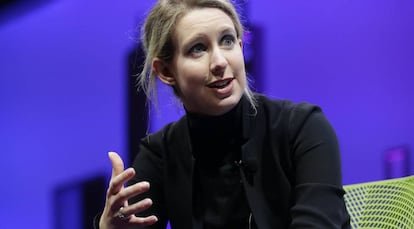Elizabeth Holmes: the self-made billionaire behind Silicon Valley’s blood-test scandal goes on trial
Having reached the top through a supposedly revolutionary technology to diagnose disease, the Theranos founder is now facing 12 counts of fraud and conspiracy and could be sentenced to 20 years


Elizabeth Holmes, the woman who dazzled Silicon Valley with a blood-testing system capable of detecting diseases with the simple prick of a finger, is facing a dozen counts of fraud and conspiracy. Jury selection began on Tuesday to find 12 people who will define the future of the creator of the biotech startup Theranos in a federal court in San Jose, California.
The Department of Justice accuses the 37-year-old entrepreneur and her former business partner and ex-boyfriend, Ramesh Balwani, 56, of defrauding investors, doctors and patients. Both have pleaded not guilty. With Holmes facing the prospect of up to 20 years behind bars, her attorneys plan to argue that the deception was not deliberate and that Balwani manipulated and abused their client during the years they ran the scam.
Holmes founded Theranos in 2003 when she was just 19 years old. She dropped out of Stanford University with the idea of reinventing the work of clinical laboratories. Her story was that a fear of syringes and an uncle’s cancer led her to invent a system to detect diseases such as HIV and diabetes in a matter of minutes with just a prick of the index finger. Heavyweights such as media mogul Rupert Murdoch invested in the company, which by 2009 was valued at $9 billion. It was part of the select club of unicorns – the name for privately held companies worth more than $1 billion. The media compared her to Steve Jobs.

In 2015, at age 30, Holmes, a blonde, slender, doe-eyed entrepreneur who invariably wore black, became the youngest woman to make the Forbes list of the 400 richest people in the US. Her fortune was estimated at more than $4.5 billion – just over €3.5 billion, half the amount her company Theranos was then valued at. But by the following year, Theranos had disappeared from the list and was facing scrutiny from authorities, scientists and investors.
An investigation by The Wall Street Journal revealed that the results of the diagnostic tests were not from the system created by Holmes: 99% had been performed by machines purchased from Siemens, a company with which the startup intended to compete. On top of this, the tests that were carried out by Holmes’ system yielded erroneous results on several occasions, according to the publication. The Justice Department accused Holmes and Balwani of misleading investors by claiming that the express blood testing machines could perform a wide range of clinical analysis using a drop of blood, when both knew the effectiveness was limited, unreliable and slow.
The indictment was a scandal of vast proportions, not only because Holmes had become the face of innovation in biotechnology, but also because her product was on sale in Walgreens, the main drugstore chain in the United States, and in Safeway stores in a number of cities. It was a startup in which former US President Bill Clinton and Mexican business tycoon Carlos Slim had invested. The company’s own board included senators, generals, high-level entrepreneurs and even former Secretary of State Henry A. Kissinger. None of them had looked into the product thoroughly. The story of the young woman who had dropped her studies to pursue her dream had been enough.
The US Securities and Exchange Commission (SEC) concluded that Holmes had created a fraudulent scheme that enabled her to raise investments worth $750 million. The SEC also pointed the finger at Balwani, Theranos president and chief operating officer at the time of the scam. Both used false information to convince investors that they had their hands on a unique blood-testing system. “They exaggerated and lied about the company’s technology, business and financial performance,” the regulator revealed. The alleged fraudsters will be tried separately.
In court documents against Holmes, federal prosecutors note that “tens of thousands of patients may have been affected” by the fraud or may have received “unnecessary or harmful” treatments and diagnoses. Witnesses who will take the stand in the trial include a pregnant woman who was mistakenly diagnosed as having miscarried as well as people who were erroneously diagnosed with HIV. Prosecutors in 2018 issued a subpoena requesting the patient database to establish a possible pattern of incorrect results, but Theranos employees destroyed it.
Holmes’ lawyers are expected to argue that she did not mislead her investors and patients deliberately, and that if she exaggerated the product’s capabilities and results it was because she was clouded by ambition. The popular phrase “fake it ‘til you make it,” which encapsulates Silicon Valley business culture, is likely to feature large in the court proceedings. Court documents filed during the last weekend of August by Holmes’ defense reveal that they plan to accuse her former partner of psychological, emotional and sexual abuse, “essentially dominating her and erasing her ability to make decisions,” according to local media reports. Balwani denies everything.
Now married to Billy Evans, the heir to a California hotel chain, Holmes has just given birth. Her personal situation and the pandemic have forced repeated postponements of the trial. Opening arguments are slated to begin on September 8 and the trial is scheduled to last four months.
English version by Heather Galloway.
Tu suscripción se está usando en otro dispositivo
¿Quieres añadir otro usuario a tu suscripción?
Si continúas leyendo en este dispositivo, no se podrá leer en el otro.
FlechaTu suscripción se está usando en otro dispositivo y solo puedes acceder a EL PAÍS desde un dispositivo a la vez.
Si quieres compartir tu cuenta, cambia tu suscripción a la modalidad Premium, así podrás añadir otro usuario. Cada uno accederá con su propia cuenta de email, lo que os permitirá personalizar vuestra experiencia en EL PAÍS.
¿Tienes una suscripción de empresa? Accede aquí para contratar más cuentas.
En el caso de no saber quién está usando tu cuenta, te recomendamos cambiar tu contraseña aquí.
Si decides continuar compartiendo tu cuenta, este mensaje se mostrará en tu dispositivo y en el de la otra persona que está usando tu cuenta de forma indefinida, afectando a tu experiencia de lectura. Puedes consultar aquí los términos y condiciones de la suscripción digital.








































